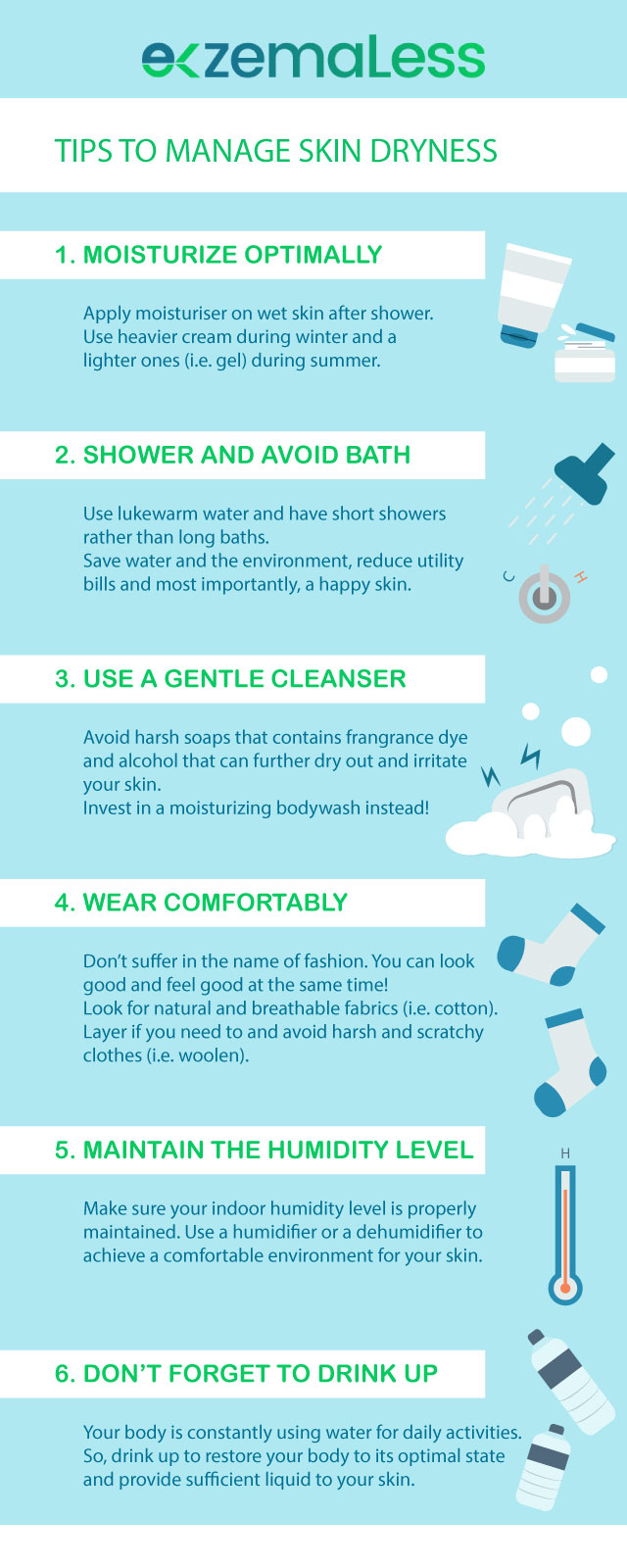Managing Eczema in Dry Weather

Dry skin
The skin is the largest organ and the outermost layer of the body. It acts as a barrier to entry for foreign particles and is made up of cells containing water. Depending on our actions and surrounding conditions, pores in our skin allow water to evaporate. Weather conditions affect our skin and are hardest to control. Extreme weather conditions whether extreme heat or extreme cold and extremely dry or extremely humid, have a direct impact on people suffering from Eczema. In this article, we shall discuss the implications of dry weather conditions for Eczema sufferers.
One of the most visible symptoms of Atopic Dermatitis is dry and scaly skin. It is well known that this condition in eczema worsens when the skin dries up. Dry weather combined with low temperatures especially in winters further worsens this condition causing eczema to flare. In other words, dryness acts as a trigger to cause a flare. Even people without eczema have an urge to scratch on waking up in dry weather.
It is very important for people suffering from eczema to retain skin moisture. When the weather is extremely dry, the air in the environment steals the moisture from the skin, drying it out and triggering an eczema flare-up. Moreover, alternating between cold and dry climate, when outdoors and indoors, can aggravate eczema symptoms. Often people find their dermatitis symptoms on parts of the body that are exposed to the weather elements.
How to manage eczema in dry weather?
The best course to manage Eczema in extreme weather conditions is to make changes to your lifestyle. The quicker you adapt to the weather, the lesser the effect on Eczema. Custom care regimens given by doctors for individuals should take into account the effect of weather that the individual is exposed to.



Moisturizing strategy
One of the most effective, easy and cheap treatments is to use moisturizers abundantly. Moisturize skin at least twice a day. Lock the moisture in the skin to help hydration by applying moisturizer right after a bath on wet skin. This will help repair the skin barrier. Change your moisturizer strategy, especially in dry winter, use thick moisturizer instead of lotions (e.g. Petroleum jelly) soon after the bath and give a good amount of time for absorption. Though it may be tedious and time-consuming it is an effective strategy. Cover your hands and face with moisturizer before dropping out in the cold petroleum jelly and emollient can be used to cover the lips.
Bathing
Hot water baths heat up your body resulting in skin moisture being lost due to evaporation. Also, sudden changes in temperature may irritate skin. Use lukewarm water for bathing and keep baths short. Avoid harsh soaps with fragrance dye and alcohol, which can further dry and irritate the skin, rather use moisturizing soap. Moisturize immediately after a shower so that you can retain and lock the moisture.
Comfortable clothes
Use natural and fabrics and always try to dress in layers so that you can respond to changes in temperature. Do not dress too warm so as to cause a sweat which worsens Eczema giving rise to scratch and itch cycle. Avoid harsh and scratchy clothes especially woolen clothes which people wear to seek protection from cold.
Humidifier
Generally during dry and cold weather, people use heaters and the heating system pumps in lot of hot air into the room. This hot air irritates eczema affected skin increasing the chance to flare. Use Humidifier to maintain the humidity indoors. 50% relative humidity is considered ideal for keeping eczema affected skin moist. Keep your house environment comfortable maintaining the temperature and humidity level so as to get sound sleep.
Consume Liquids
Even though you don’t feel thirst keep drinking water as our body tends to lose water via various processes as it is made up of 70% of water. Consuming liquids not only protect your skin from dry weather but also beautifies, gives a glow and keeps your skin supple and healthy.
GET IN CONTROL OF YOUR ECZEMA
Use our AI tool to check the severity of Eczema and keep track of your Eczema progress.



